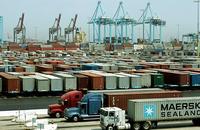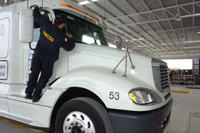-
Authors suggest ways to alleviate L.A. cargo port "constipation"

In January, the port of Los Angeles received more than 330,000 containers; the possibility that one of those 330,000 containers could have contained a dirty bomb, or worse, keeps security experts up at night; experts say that to ensure security and prevent logjams, the best approach to container security would be to replace the current system, which singles out only those containers whose documentation raises questions, with a system which will see terminal operators X-ray every container, regardless of its eventual destination; only those containers flagged during the low-level scan would be subjected to a more thorough search
-
-
Mark Krikorian, executive director of the Center for Immigration Studies
Mark Krikorian, the executive director of the Center for Immigration Studies, was interviewed by Homeland Security NewsWire’s executive editor, Eugene Chow; Krikorian discusses the Obama administration’s immigration strategy, why mass migration is an outdated phenomenon, and what the government can do to enforce immigration laws effectively; “make E-Verify mandatory,” he says
-
-
GAO scrutinizes DHS financial management system
The Government Accountability Office (GAO) has thrown a wrench in DHS’s long-running effort to modernize its financial management system, upholding a protest of the department’s most recent award; the decision could be significant for agencies reevaluating their IT programs in the wake of a slate of Office of Management and Budget (OMB) reviews launched last year
-
-
Michigan law enables executives to privatize security
Michigan’s new Emergency Manager law, in addition to allowing previously negotiated union contracts to be voided, gives appointees the authority to privatize police services and jails; some are worried that the rush to cut police labor costs will impair public safety; critics say that savings from privatization are illusory
-
-
After EPA fine, mining company building $200 million water treatment plant

America’s largest underground coal mining company, Consol Energy, is constructing a $200 million water treatment plant in West Virginia, after being fined $5.5 million by the Environmental Protection Agency (EPA); in 2009 discharge from Consol’s mining operation caused a toxic golden algae bloom that killed aquatic life along thirty miles of Dunkard Creek; the advanced waste water treatment plant will be the largest facility in Appalachia; the plant will be capable of treating 3,500 gallons of water per minute and will remove more than forty-three tons of dissolved solids, including eleven million pounds of chloride
-
-
Lodi, CA considers privatizing $36 million water plant
The city of Lodi, California is in the midst of building a new $36 million water treatment plant, and is considering privatizing the facility; the new plant will open in 2012 and provide the city with one-third of its drinking water; Lodi is in a tight financial situation and is considering methods to reduce costs like privatizing the new treatment plant; the treatment facility is expected to cost $1.8 million to operate annually with an additional $1 million for payroll; Lodi residents have proposed that the city hire a private company to save money on payroll
-
-
Innovative decontamination cloth reaches market
A new decontamination cloth, developed for use by soldiers and first responders, is now available in several forms — as preshaped mitts for personal wipedowns if someone is exposed to toxins or chemicals, individual wipe cloths and pads, and in rolls perforated to produces 12-inch by 12-inch sheets, like paper towels in a kitchen
-
-
Surveillance tech developers capture Breakthru venture capital
Three academics from the University of New Brunswick were awarded $285,000 in cash, the richest entrepreneurship competition in Canada, to continue developing better surveillance camera technology
-
-
Missouri City seeing significant rise in IT job market
Nine years ago, the metropolitan region of Springfield, Missouri had 280 computer support specialists. In 2009 there were 1,300; despite the bust of the dotcom bubble in the early 2000s, information technology remains an attractive and growing sector in the local economy
-
-
Monitoring Mexican trucks operating in the U.S.

The U.S. plan to equip Mexican trucks with electronic recorders for driver logs would be a limited, temporary program undertaken because it is the only way the Federal Motor Carrier Safety Administration (FCMSA) can ensure that the Mexican trucks will be monitored, the U.S. government says; under (NAFTA), the United States cannot require Mexican carriers to do anything that U.S. carriers are not required to do, but the government still must provide a way to monitor Mexican carriers for compliance with both the hours of service rules and the cabotage rules that restrict freight hauling between points in the United States
-
-
Shock absorbers making buildings earthquake-proof
An upstate New York manufacturer has developed dampers, or shock absorbers, which increase the earthquake resistance of a building by threefold; the patented dampers are based on technology first developed by the military to protect U.S. missile silos against Russian attacks during the cold war
-
-
China overwhelming U.S. with counterfeit goods
U.S. companies are losing hundreds of millions of dollars a year in sales from products that are counterfeited overseas and shipped to America; since most fake products are never seized by authorities, the federal government cannot get an accurate measurement of the economic loss; according to CBP, these fake goods “threaten America’s economic vitality and national security, and the American people’s health and safety”
-
-
Biometric ATMs appearing in Poland, U.S. lags far behind

More banks around the world are installing biometric ATMs that use finger vein scanning technology to authenticate a customer’s identity before they can withdraw cash; unlike current fingerprint scanners, the finger vein scanner uses infrared light to analyze the micro veins beneath the surface of the finger; banks around the world including Japan, Mexico, and Africa have begun installing these new ATMs, but they have yet to appear in the United States; critics worry that the ATMs are too invasive and a study last year found that 50 percent of Europeans would not use them; banks in the United States lack the financial incentive to install these devices
-
-
Dignity preserving undies under development
New undergarments aim to protect air travelers’ privacy and dignity; the underwear is covered with a special paint made from a mixture of barium sulphate, aluminum, ground glass, and other materials that work to reflect and scatter X-rays; the undergarments block out passengers’ privates, while still allowing operators to see dangerous objects such as guns, knives, and explosives
-
-
The problems with major disasters

There are three problems with major disasters: small miscalculations of probabilities can have large effects on outcomes when dealing with large events; our reward structures do not encourage spending the time or the money to deal with low-probability disasters; the very complexity of modern life — including our transportation and communication systems, our economy and our social interactions — is directly implicated in the severity of catastrophes; in more complex systems, even small changes or perturbations can have disproportionate and unpredictable effects
-
More headlines
The long view
Ransomware Attacks: Death Threats, Endangered Patients and Millions of Dollars in Damages
A ransomware attack on Change Healthcare, a company that processes 15 billion health care transactions annually and deals with 1 in 3 patient records in the United States, is continuing to cause massive disruptions nearly three weeks later. The incident, which started on February 21, has been called the “most significant cyberattack on the U.S. health care system” by the American Hospital Association. It is just the latest example of an increasing trend.
Chinese Government Hackers Targeted Critics of China, U.S. Businesses and Politicians
An indictment was unsealed Monday charging seven nationals of the People’s Republic of China (PRC) with conspiracy to commit computer intrusions and conspiracy to commit wire fraud for their involvement in a PRC-based hacking group that spent approximately 14 years targeting U.S. and foreign critics, businesses, and political officials in furtherance of the PRC’s economic espionage and foreign intelligence objectives.
European Arms Imports Nearly Double, U.S. and French Exports Rise, and Russian Exports Fall Sharply
States in Europe almost doubled their imports of major arms (+94 per cent) between 2014–18 and 2019–23. The United States increased its arms exports by 17 per cent between 2014–18 and 2019–23, while Russia’s arms exports halved. Russia was for the first time the third largest arms exporter, falling just behind France.
LNG Exports Have Had No Impact on Domestic Energy Costs: Analysis
U.S. liquified natural gas (LNG) exports have not had any sustained and significant direct impact on U.S. natural gas prices and have, in fact, spurred production and productivity gains, which contribute to downward pressure on domestic prices.
